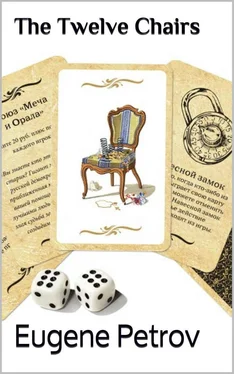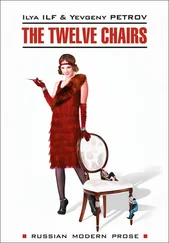Eugene Petrov - The Twelve Chairs
Здесь есть возможность читать онлайн «Eugene Petrov - The Twelve Chairs» весь текст электронной книги совершенно бесплатно (целиком полную версию без сокращений). В некоторых случаях можно слушать аудио, скачать через торрент в формате fb2 и присутствует краткое содержание. Год выпуска: 2013, Жанр: Юмористическая проза, на английском языке. Описание произведения, (предисловие) а так же отзывы посетителей доступны на портале библиотеки ЛибКат.
- Название:The Twelve Chairs
- Автор:
- Жанр:
- Год:2013
- ISBN:нет данных
- Рейтинг книги:5 / 5. Голосов: 1
-
Избранное:Добавить в избранное
- Отзывы:
-
Ваша оценка:
- 100
- 1
- 2
- 3
- 4
- 5
The Twelve Chairs: краткое содержание, описание и аннотация
Предлагаем к чтению аннотацию, описание, краткое содержание или предисловие (зависит от того, что написал сам автор книги «The Twelve Chairs»). Если вы не нашли необходимую информацию о книге — напишите в комментариях, мы постараемся отыскать её.
Find traces of a separate headset difficult and heroes face different adventures and troubles.
The Twelve Chairs — читать онлайн бесплатно полную книгу (весь текст) целиком
Ниже представлен текст книги, разбитый по страницам. Система сохранения места последней прочитанной страницы, позволяет с удобством читать онлайн бесплатно книгу «The Twelve Chairs», без необходимости каждый раз заново искать на чём Вы остановились. Поставьте закладку, и сможете в любой момент перейти на страницу, на которой закончили чтение.
Интервал:
Закладка:
and was due to sail from Nizhni to Tsaritsin, calling at every river port,
and holding a government-bond lottery. A complete government department had
left Moscow for the trip, including a lottery committee, an office staff, a
brass band, a cameraman, reporters from the central press and the Columbus
Theatre. The theatre was there to perform plays which popularised the idea
of government loans. Up to Stalingrad the Columbus Theatre was on the
establishment of the lottery committee, after which the theatre had decided
to tour the Caucasus and the Crimea with The Marriage at its own risk.
The Scriabin was late. A promise was given that she would leave the
backwater, where last-minute preparations were being made, by evening. So
the whole department from Moscow set up camp on the quayside and waited to
go aboard.
Tender creatures with attache1 cases and hold-alls sat on the bundles
of wire, guarding their Underwoods, and glancing apprehensively at the
stevedores. A citizen with a violet imperial positioned himself on a
mill-stone. On his knees was a pile of enamel plates. A curious person could
have read the uppermost one:
Mutual Settlement Department
Desks with ornamental legs and other, more modest, desks stood on top
of one another. A guard sauntered up and down by a sealed safe. Persidsky,
who was representing the Lathe, gazed at the fairground through Zeiss
binoculars with eightfold magnification.
The S.S. Scriabin approached, turning against the stream. Her sides
were decked with plyboard sheets showing brightly coloured pictures of
giant-sized bonds. The ship gave a roar, imitating the sound of a mammoth,
or possibly some other animal used in prehistoric times, as a substitute for
the sound of a ship's hooter.
The finance-and-theatre camp came to life. Down the slopes to the quay
came the lottery employees. Platon Plashuk, a fat little man, toddled down
to the ship in a cloud of dust. Galkin, Palkin, Malkin, Chalkin and Zalkind
flew out of the Raft beer-hall. Dockers were already loading the safe.
Georgetta Tiraspolskikh, the acrobatics instructress, hurried up the gangway
with a springy walk, while Simbievich-Sindievich, still worried about the
scenic effects, raised his hands, at one moment to the Kremlin heights, and
at another towards the captain standing on the bridge. The cameraman carried
his camera high above the heads of the crowd, and as he went he demanded a
separate cabin in which to set up a darkroom.
Amid the general confusion, Ippolit Matveyevich made his way over to
the chairs and was about to drag one away to one side.
"Leave the chair alone!" snarled Bender. "Are you crazy? Even if we
take one, the others will disappear for good. You'd do better to think of a
way to get aboard the ship."
Belted with brass tubes, the band passed along the landing-stage. The
musicians looked with distaste at the saxophones, flexotones, beer bottles
and Esmarch douches, with which the sound effects were armed.
The lottery wheels arrived in a Ford station wagon. They were built
into a complicated device composed of six rotating cylinders with shining
brass and glass. It took some time to set them up on the lower deck. The
stamping about and exchange of abuse continued until late evening.
In the lottery hall people were erecting a stage, fixing notices and
slogans to the walls, arranging benches for the visitors, and joining
electric cables to the lottery wheels. The desks were in the stern, and the
tapping of typewriters, interspersed with laughter, could be heard from the
typists' cabin. The pale man in the violet imperial walked the length of the
ship, hanging his enamel plates on the relevant doors.
Mutual Settlement Department
Personnel Department
Office
Engine Room
To the larger plates the man with the imperial added smaller plates.
No entry except on business
No consultations
No admittance to outsiders
All inquiries at the registry
The first-class saloon had been fitted up for an exhibition of bank
notes and bonds. This aroused a wave of indignation from Galkin, Palkin,
Malkin, Chalkin and Zalkind.
"Where are we going to eat?" they fretted. "And what happens if it
rains?"
"This is too much," said Nich. Sestrin to his assistant. "What do you
think, Seryozha? Can we do without the sound effects?"
"Lord, no, Nicholas Constantinovich. The actors are used to the rhythm
by now."
A fresh racket broke out. The "Five" had found that the stage manager
had taken all four chairs to his cabin.
"So that's it," said the "Five" ironically. "We're supposed to rehearse
sitting on our berths, while Sestrin and his wife, Gusta, who has nothing to
do with our group, sit on the four chairs. Perhaps we should have brought
our own wives with us on this trip."
The lottery ship was watched malevolently from the bank by the smooth
operator. A fresh outbreak of shouting reached the concessionaires' ears.
"Why didn't you tell me before?" cried a committee member.
"How was I to know he would fall ill."
"A hell of a mess we're in! Then go to the artists'-union office and
insist that an artist be sent here immediately."
"How can I? It's now six o'clock. The union office closed long ago.
Anyway, the ship is leaving in half an hour."
"Then you can do the painting yourself. Since you're responsible for
the decorations on the ship, get out of the mess any way you like!"
Ostap was already running up the gangplank, elbowing his way through
the dockers, young ladies, and idle onlookers. He was stopped at the top.
"Your pass?'
"Comrade!" roared Bender. "You! You! The little fat man! The one who
needs an artist!"
Five minutes later the smooth operator was sitting in the white cabin
occupied by the fat little assistant manager of the floating lottery, and
discussing terms.
"So we want you to do the following, Comrade," said fatty. "Paint
notices, inscriptions, and complete the transparent. Our artist began the
work, but is now ill. We've left him at the hospital. And, of course,
general supervision of the art department.
Can you take that on? I warn you, incidentally, there's a great deal of
work."
"Yes, I can undertake that. I've had occasion to do that kind of work
before."
"And you can come along with us now?"
"That will be difficult, but I'll try."
A large and heavy burden fell from the shoulders of the assistant
manager. With a feeling of relief, the fat man looked at the new artist with
shining eyes.
"Your terms?" asked Ostap sharply. "Remember, I'm not from a funeral
home."
"It's piecework. At union rates."
Ostap frowned, which was very hard for him.
"But free meals as well," added the tubby man hastily. "And a separate
cabin."
"All right," said Ostap, "I accept. But I have a boy, an assistant,
with me."
"I don't know about the boy. There are no funds for a boy. But at your
own expense by all means. He can live in your cabin."
"As you like. The kid is smart. He's used to Spartan conditions."
Ostap was given a pass for himself and for the smart boy; he put the
key of the cabin in his pocket and went out onto the hot deck. He felt great
satisfaction as he fingered the key. For the first time in his stormy life
he had both a key and an apartment. It was only the money he lacked. But
there was some right next to him in the chairs. The smooth operator walked
Читать дальшеИнтервал:
Закладка:
Похожие книги на «The Twelve Chairs»
Представляем Вашему вниманию похожие книги на «The Twelve Chairs» списком для выбора. Мы отобрали схожую по названию и смыслу литературу в надежде предоставить читателям больше вариантов отыскать новые, интересные, ещё непрочитанные произведения.
Обсуждение, отзывы о книге «The Twelve Chairs» и просто собственные мнения читателей. Оставьте ваши комментарии, напишите, что Вы думаете о произведении, его смысле или главных героях. Укажите что конкретно понравилось, а что нет, и почему Вы так считаете.












